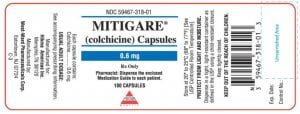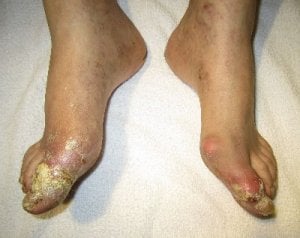Do you wonder why you have gout?
Is it bad diet, bad lifestyle choices or just bad luck?
There can be a host of reasons why we get gout, and I reviewed them in What Causes Gout? Now, I want to focus on the genetics of gout.
Hereditary Gout Study
There is an interesting study of the hereditary aspects of gout. Tony Merriman and Nicola Dalbeth have investigated how different genes are associated with different aspects of gout and high uric acid.[1]
Hereditary Gout Checkpoints
This study identifies key checkpoints for gout:
- Uric Acid Production
- Though there are many causes of excess uric acid production, as described in the gout symptoms guidelines, this gout study notes that genetic causes are rare. The hereditary causes of excess uric acid production are:
rare genetic causes such as hypoxanthine-guanine phosphoribosyltransferase (HPRT) deficiency and PRPP synthetase (PRS) superactivity
- Uric Acid Excretion
- The report identifies 6 genes that limit uric acid excretion in different ways. The most important gene, SLC2A9 accounts for less than 5% of effects on people with Caucasian ancestry. However, other genes with smaller effects contribute to the personal reduction of uric acid excretion.
- Uric Acid Crystal Deposits
- Not all people with high uric acid (hyperuricemia) develop gout. The authors note research into other factors that can trigger crystals to form, and suggest some of these may have genetic links.
- Inflammation
- The pathway that leads from uric acid to gout pain is very complicated. It involves the immune system, yet people vary in their immune response to uric acid crystals. Also, inflammation resolves much quicker for some people than others.
- Tophi and Bone Erosion
- With prolonged exposure to high uric acid, tophi form and spread throughout the body. Again, the rate at which this happens, and the amount of damage, differ significantly from person to person.
For the first two checkpoints, some hereditary links have been confirmed, but the authors note that more research is needed. This is especially the case for the last three checkpoints where personal variations suggest genetic links are likely. Many hereditary factors still need to be investigated, especially with large specific genetic groups.
Gout Genes
Various studies have been carried out on the six genes that affect uric acid excretion. I have summarized the data from the report in this picture:

What to do about Hereditary Gout Symptoms
Though it is interesting to move away from the common focus of gout diet, we know that here is nothing we can do to change our genes.
What you must do, if there is any doubt about your gout diagnosis, is to study the gout symptoms guidelines first. Once you have a confirmed gout diagnosis from your doctor, you can discuss gout treatment with him. Once you have a gout treatment plan that suits your personal situation, you might be able to improve your diet to boost your treatment plan.
Leave Is Your Gout Hereditary to browse the Gout Symptoms guidelines.
Hereditary Gout References
- Title:
- The genetic basis of hyperuricaemia and gout.
- Authors:
- Merriman TR, Dalbeth N.
- Published:
- Joint Bone Spine. 2011 Jan;78(1):35-40
Please give your feedback
Did this page help you? If yes, please consider a small donation. Your donations help keep GoutPal's gout support services free for everyone.
If not, please tell me how I can improve it to help you more.
- YouTube
- The gout forums.











